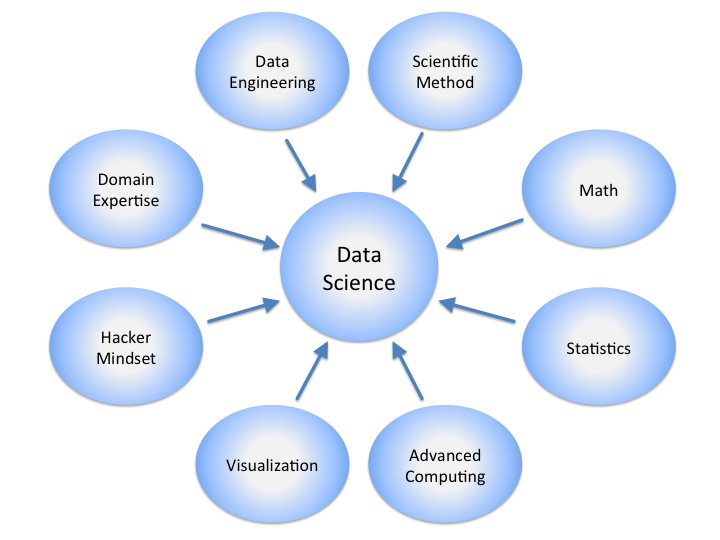Organizations from all industries and of all scales and sizes understand the power, opportunities, and leverage of data. Whether it’s to unlock never before available levels of operational efficiency, eliminating the minutest of bottlenecks in customer acquisition and engagement, or propelling the innovation rocket forth — data is the key. However, the trend in the past few years, on an enterprise front, has been to invest in data analytics tools instead of ramping up the enterprise’s internal capabilities around data science.
Why data science?

Data science applied correctly helps make data management such a core skill that it succeeds in helping the organization unlock the next levels of performance, and in the process, achieve massive returns on investments. Instead of setting up disparate data management mechanisms and relying on data analytics platforms that operate in silos, data science makes sure that the enterprise leverages data analytics to gather insights in pretty much everything, right from vendor relations management to supply chain management, from customer reengagement to product design.
Bolstering the enterprise’s internal data science capabilities
Though enterprises are starting to invest in dedicated data science teams and align their chief data officer’s key responsibilities toward data science capability build up, most companies are still coming to terms with the idea of data as an asset.
A question that’s bound to come up is — if we’re buying everything as a service, why worry about building up data science capabilities in-house? Well, the answer is, nobody will ever understand your data as well as you do! There is way too little standardization in terms of how enterprises create, store, access, analyze, and archive data. Additionally, different teams and departments do it differently. The result — vendor-driven data analytics systems prove difficult to scale up and roll out. Secondly, wholesome data analytics-driven success is contingent on how the enterprise is able to evolve, mature, and adjust its practices of data management with time. Data science encompasses all these aspects, and internal data science capabilities make sure that the organization is quickly able to include new processes and data streams into existing data analytics channels, creating insight and value almost instantly.

Hire seasoned data scientists
If you’re reading this, chances are that the idea of data scientists facilitating great business outcomes excites you. To kick start your enterprises adventures and efforts in internal data science capability scale up, you’d need to hire at least a few data scientists who’ve showcased their potential and prowess in a business setting.
The past five years have laid the perfect launch pad for data science to go big. And people who’ve served enterprises of similar scale and size as yours (or preferably, also operating in the same industry) are best placed to give your efforts a great start. This initial impetus helps break off the inertia within the enterprises. A good strategy is to identify what your top teams that can do with a seasoned data scientist to drive things forward.
Establish academia connections
Data scientists, generally, are Ph.D. degree holders; you can well imagine the dearth in the skills market, and the difficulties in internal promotions to fill vacancies in your enterprise. This is where several leading companies are exploring the academia partnership route of upgrading their internal data science capabilities.
- Research the leading enterprises in your market, and find out which academic institutes they’ve linked up with to get executive education for their employees, and see if you can stick your foot in the door there somewhere.
- Enterprises need to invest time in identifying individuals who’d show the commitment and basic skills to take up the subsidized data science courses and deliver long-term benefits to the organization.
- A massive advantage of academia-backed trainings and courses for your enterprises expert data analysts is that the courses can be fine-tuned and contextualized to suit your enterprise’s interests.
Communication: A key job description for data scientists
Remember, data science translates into business advantages only when there is adequate, clear, and unhindered communication between the data scientist and business stakeholders. In fact, most enterprises that now have stabilized and well-oiled data science mechanisms in place cite communication as one the critical reasons for their success.
Another reason why communication management becomes so important for ramping up internal data science capabilities is that the findings of these efforts often question the most cherished beliefs of key decision makers in the enterprise. Good communication ensures that data scientists find an unintimidating environment that promotes and motivates them to build insight on how business practices can be improved.
Connect all data streams to the data science knowledge center
BI, data analytics, data streams, and more — the data ecosystem of a modern enterprise is complex, multifaceted, unstructured, and highly sophisticated.
Data scientists need a lot more than the structured and selective data that isolated data analytics systems work on. They contextualized, relevant, and interesting data from unconventional sources as well to perform exploratory studies around several hypotheses.
To quickly create an effective data science knowledge center that is empowered to issue data-backed guidelines to bring in far reaching benefits, enterprises need to connect all components of the data vehicle to the data science engine.
Tie everything with business contexts
A common problem faced by enterprises when they put Ph.D. holder data scientists at the help of affairs is that the focus can often waver from business and get stuck on technology itself. Data science capabilities in an enterprise context are, ideally, tied to business goals. All investments, short- and long-term programs, hiring decisions, and expenses on training and development of data scientists, at the end of the day, need to be justified by the resulting improvements in business goals.
Photo credit: Shutterstock



